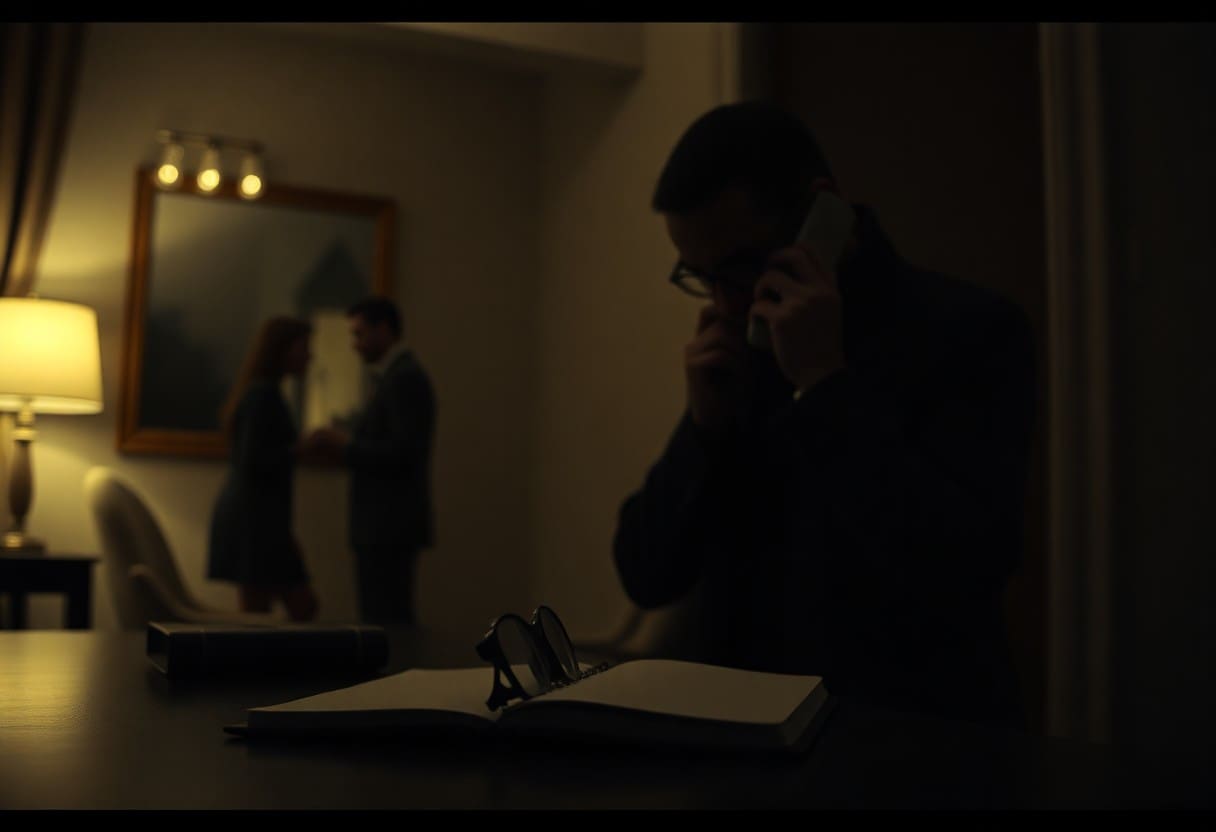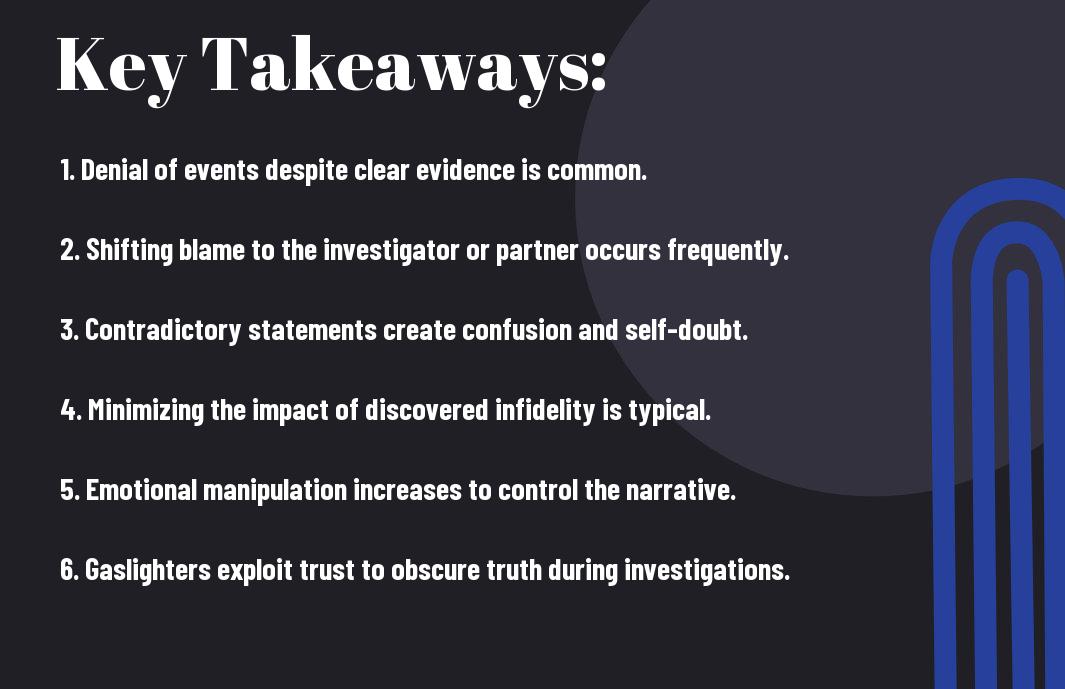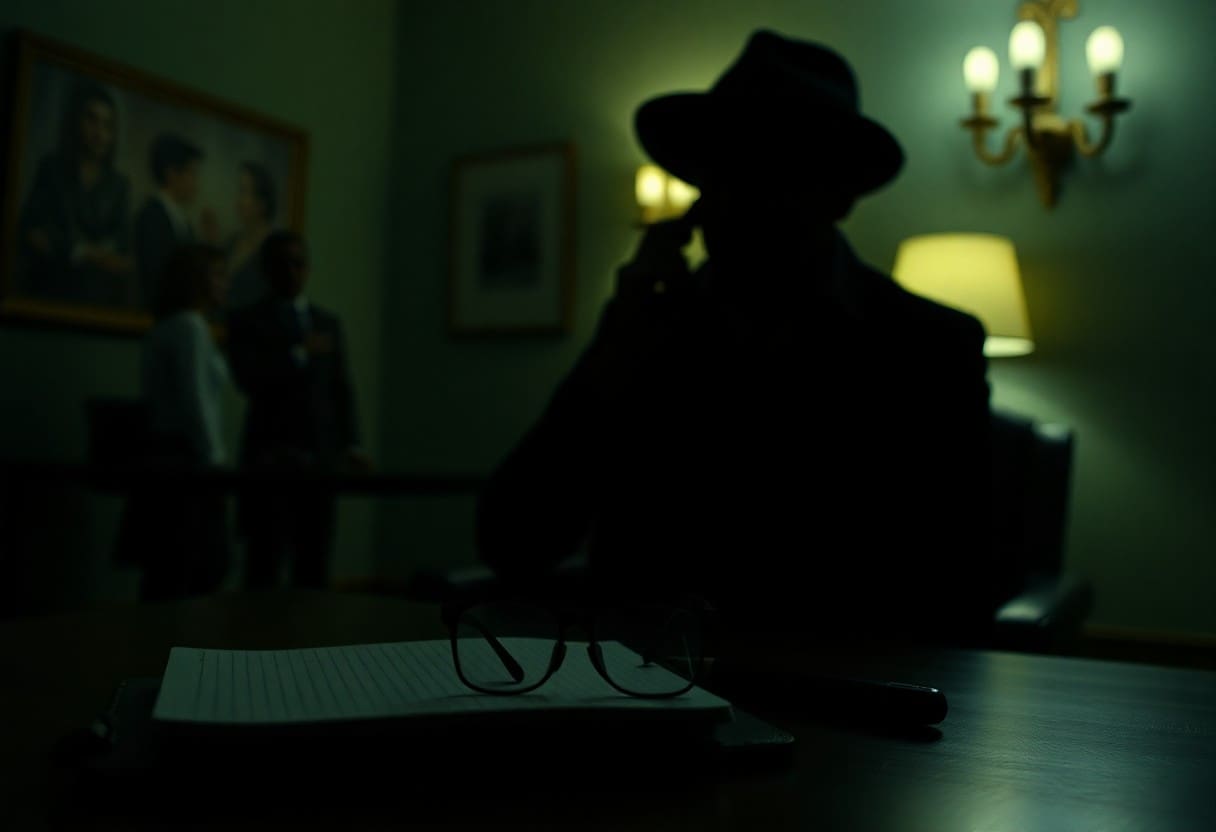It’s imperative to recognize the warning signs of gaslighting during infidelity investigations, as this manipulative behavior can distort your perception of reality and impact your emotional well-being. You may encounter tactics designed to confuse or undermine your confidence in your own observations and instincts. In this post, we’ll explore 14 key indicators that can help you identify gaslighting, empowering you to navigate the challenges of infidelity with greater clarity and strength. Understanding these signs can be the first step toward reclaiming your sense of self and finding the truth in your situation. Our specialists at Digital Forensic Squad will assist you with recognizing whether your cheating partner gaslighting you .
Key Takeaways:
- Gaslighting may manifest as denial or manipulation, where the unfaithful partner distorts reality to make their spouse question their perceptions.
- Common signs include constant blame-shifting, dismissive behavior towards concerns, and attempts to isolate the partner from support systems.
- Being aware of emotional manipulation tactics can empower individuals to seek clarity and support during troubling times in their relationship.

Understanding Gaslighting
Before you can identify gaslighting behaviors during infidelity investigations, it is crucial to have a clear understanding of what gaslighting is and how it manifests. Awareness of this psychological manipulation can empower you to protect your emotional well-being and navigate the challenges you may face in uncovering the truth about your partner’s actions.
Definition of Gaslighting
Among the various forms of emotional manipulation, gaslighting is a deliberate tactic used to make you doubt your perception, memories, and reality. This form of psychological abuse often erodes your self-esteem and sense of identity, making it difficult for you to trust yourself or your instincts.
Common Tactics Used
Against the backdrop of infidelity, gaslighting can manifest in several ways. It may involve your partner dismissing your feelings, denying past events, or insisting that you overreacted to their actions. These tactics serve to distort your view of reality, leaving you feeling confused and helpless.
Further, common tactics of gaslighting may include projecting blame onto you for their behavior, trivializing your concerns, or using lies to create a false narrative. They may also feign innocence or confusion, convincing you that your emotional responses are unjustified. Each of these strategies is aimed at eroding your confidence and perception of reality, ultimately leaving you feeling disoriented and isolated in your pursuit of the truth.

Identifying Signs of Gaslighting
One of the most troubling aspects of gaslighting is its subtle nature, making it hard to spot. By familiarizing yourself with the warning signs of gaslighting , you can better protect yourself during infidelity investigations. Watch for changes in behavior that leave you doubting your reality, feelings, and perceptions.
Changes in Communication
Behind any attempt to undermine your certainty, you might notice changes in communication. This could manifest as dismissive remarks or a sudden shift in tone that makes you feel invalidated.
Manipulation of Facts
With gaslighting, you may encounter a frequent manipulation of facts that leaves you feeling confused about your recollections and experiences. This tactic serves to distort your reality and erode your self-trust.
It is alarming how often the facts can be twisted to suit the gaslighter’s narrative, leaving you questioning even the most straightforward events. Your memories may be challenged, or you might be led to believe that you misinterpreted conversations or actions. This consistent undermining of your perception can sow doubt and cause you to rely more on your partner’s version of reality, further entrenching the gaslighting dynamic.
Emotional Responses to Gaslighting
Your emotional landscape can drastically shift during a gaslighting experience, as manipulative tactics often leave you unsure of your thoughts and feelings. You may notice a range of responses, including confusion, irritation, and despair. Over time, these emotional shifts can lead to a diminishing sense of self-worth, making it difficult for you to trust your instincts or seek help.
Confusion and Self-Doubt
Before long, the consistent denial of your reality can foster deep confusion and self-doubt. You may find yourself questioning your memories and feelings, leading to a constant cycle of insecurity. This internal conflict can leave you feeling detached from your own truth, making it hard to maintain perspective on the infidelity situation at hand.
Isolation from Support Systems
Confusion surrounding your emotions often leads to isolation from your support systems. Your trust in family and friends may wane as gaslighting undermines your confidence in what is real. You may start avoiding conversations with loved ones, fearing they won’t understand your emotional turmoil or may further validate your anxiety.
Even when your instincts urge you to reach out, the lingering effects of gaslighting can make you feel undeserving of support. The isolation can exacerbate feelings of loneliness and despair, further entrenching you in the emotional chaos created by gaslighting. Seeking help often feels impossible, reinforcing the very sense of disconnection that the gaslighter seeks to create.
Gaslighting During Infidelity
To navigate the turbulent waters of infidelity, it’s important to recognize gaslighting behaviors that may obscure the truth. Gaslighting often manifests as manipulation, where your partner attempts to distort reality, making you question your perceptions and feelings. During infidelity investigations, you might find yourself doubting your instincts, which can complicate your search for clarity. Understanding these signs can empower you to confront the situation head-on, preserving your emotional integrity.
Doubt and Distrust in Relationships
Distrust often becomes an unwelcome companion in relationships marked by infidelity and gaslighting. When your partner minimizes your emotions or insists that you are imagining problems, it fosters a climate of confusion and suspicion. This pervasive doubt can prevent you from addressing valid concerns, further entangling you in a cycle of mistrust that jeopardizes the foundation of your relationship.
Impact on Personal Well-being
Below the surface, gaslighting during infidelity can have significant ramifications for your emotional well-being. As you grapple with feelings of inadequacy and paranoia, your mental health may suffer, leading to anxiety and depression. The uncertainty about your partner’s fidelity can leave you feeling isolated, questioning your self-worth and judgment, which can severely impact your day-to-day functioning.
Further, the emotional turmoil that arises from gaslighting can disrupt your personal life and relationships beyond your partnership. The constant stress and anxiety can affect your concentration and motivation, making it difficult to fulfill daily responsibilities or engage fully with friends and family. Prioritizing your mental well-being during this time is necessary; seek support from trusted friends, family, or professionals who can provide perspective and guidance as you navigate these complex emotions.
Strategies to Address Gaslighting
All individuals facing gaslighting during infidelity investigations need strategies to reclaim their sense of reality and assert their feelings. By recognizing this harmful manipulation, you can begin to address the inconsistencies in behaviors and words. Developing a plan to cope with these experiences empowers you, allowing you to confront the situation with clarity and confidence.
Recognizing Your Reality
Along your journey, it is necessary to validate your feelings and experiences. Start by keeping a journal of events and interactions that seem confusing or contradictory. By documenting the situation, you promote your sense of clarity, making it easier to identify patterns of gaslighting. Trusting your instincts and reflecting on what truly happened will reinforce your understanding of reality.
Seeking Professional Support
After documenting your situation, seeking professional support can provide additional insights and coping methods. Therapists specializing in emotional abuse can guide you in processing your emotions and navigating this challenging circumstance with empathy and understanding.
Support from a trained professional can be incredibly beneficial as you untangle the effects of gaslighting. A therapist offers a safe space to discuss your feelings, exploring the emotions tied to your experiences. They can assist you in developing strategies to regain your confidence and make sense of your reality. Additionally, connecting with support groups may help you realize that you are not alone in facing these struggles, allowing you to share your experiences with others who understand.
Legal and Ethical Considerations
Many individuals navigating the murky waters of infidelity investigations need to be aware of both legal and ethical implications. Understanding these considerations is important not only for protecting your rights but also for ensuring that your actions don’t inadvertently cross boundaries. As you probe into gathering evidence and seeking the truth, it’s vital to adhere to applicable laws and ethical standards that govern privacy and surveillance.
Documenting Evidence
By meticulously documenting evidence, you fortify your case in infidelity investigations. Collecting texts, emails, photographs, and any pertinent information creates a clear narrative while reducing the risk of misleading interpretations. Ensuring that your documentation is organized and appropriately stored can shield you from potential legal ramifications, empowering you to approach your situation with confidence.
Understanding Your Rights
Your awareness of your rights is significant during infidelity investigations. Knowing what is permissible in terms of evidence collection can help you navigate the complexities of your situation without infringing on privacy laws or engaging in unethical behavior.
Ethical awareness in infidelity investigations goes beyond legality—it encompasses empathy and respect for all parties involved. An understanding of your rights allows you to operate within the confines of the law while safeguarding your interests. Be diligent in seeking information through lawful means, as this not only strengthens your position but also fosters a sense of integrity in a challenging scenario. With clarity on your rights, you can pursue the truth without compromising your ethical standards.
Final Words
With these considerations in mind, you can better identify the warning signs of gaslighting during infidelity investigations. Staying vigilant and aware of your emotions and surroundings is crucial in navigating this complex situation. Trust your instincts and seek support if you feel manipulated or invalidated. By understanding these signs, you empower yourself to take necessary actions for clarity and healing in your relationship.
FAQ
Q: What are some common warning signs of gaslighting during infidelity investigations?
A: During infidelity investigations, individuals may experience gaslighting through a variety of manipulative behaviors. Common warning signs include consistent denial of events or conversations that have taken place, often compounded by the gaslighter blaming the victim for misunderstandings. Over time, this can lead the victim to question their own memory and perception of reality. Other signs may include projecting guilt onto the victim, making them feel responsible for the gaslighter’s actions, and frequently dismissing their feelings as invalid or overly emotional, thereby undermining their self-esteem and confidence.
Q: What steps can be taken if someone suspects they are being gaslighted during an infidelity investigation?
A: If someone suspects they are being gaslighted, it is vital to document instances of manipulative behavior and any conversations that contribute to feelings of confusion or doubt. Seeking support from trustworthy friends or family members can also provide perspective and validation. Professional help, such as therapy, can be instrumental in rebuilding self-esteem and gaining clarity. It is important to establish boundaries with the gaslighter, and if necessary, consider reassessing or removing oneself from the toxic environment to prioritize mental health and well-being.
Resources :

